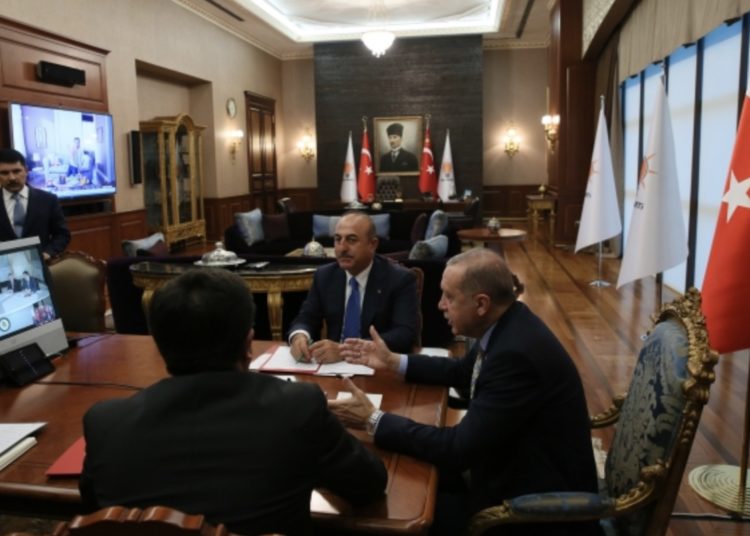Abdullah Bozkurt
Turkish President Recep Tayyip Erdogan has rushed to provide a lifeline to embattled Venezuelan President Nicolás Maduro by fast-tracking a financial and economic deal signed in a manner unprecedented in Turkish history.
The deal, officially titled “Trade Development Agreement,” was signed on May 17, 2018 through a video teleconference system in which officials from both cabinets signed the documents without exchanging them. The customary procedure for signing such agreements takes place during official visits, and the agreements signed are exchanged between the two parties.
Yet in this case both Erdoğan and Maduro were in a hurry and dropped the formalities to fast track the process in order to allow illicit trade and gold export to take place in order help the ailing Venezuelan economy. Even before the deal was signed, commercial ties between the two improved when the trade volume jumped to $1.1 billion in 2018 from $154 million, a whopping 614 percent increase year-on-year. It is worth noting that of this trade volume, $1 billion amounted to exports to Turkey from Venezuela.

The agreement was hammered out after Erdoğan’s visit to Venezuela on December 2, 2018 during which he pledged to help Maduro against the US and its allies. The trade agreement envisages the establishment of a free trade zone and the lifting or incremental reduction of tariffs and customs. Within seven years, 92 percent of tariffs are to be reduced to zero on both sides. A reduction of tariffs on an additional 2 percent of items is planned, according to the agreement, which has hundreds of pages.
The most scandalous development with respect to the trade agreement is the fact that Erdoğan inserted an authorization clause in a the bill included in the agreement when he sent the text to parliament asking lawmakers to give him discretionary powers to amend the agreement and its annexes as he wishes according to Article 2. With this unusual mandate, Erdoğan wants to fast-track changes without subjecting them to legislative review. Why he needs such authority can be partially explained by the growing illicit trade and gold exports from Venezuela.

According to Deputy Director of the Turkish Trade Ministry Hüsnü Dilemre, who is responsible for international agreements and European Union issues, Turkey had imported $900 million in gold from Venezuela as of November 2018. He testified to the Foreign Affairs Commission on May 15, 2019 and claimed that gold imports were halted after the imposition of US sanctions. However, the opposition in Turkey questioned the claim, saying that private planes from Turkish firms have made trips to Venezuela, picking up the gold from there.
The trade agreement sees a reduction in tariffs on precious metals, which may create a new loophole for the Erdoğan government to exploit the transfer of gold and other metals from Venezuela. The pretext provided by the Erdoğan government to parliament when it submitted the text for approval stated that Turkey wants to have preferential and enhanced access to the wealth of the region by using the provisions in the agreement. The Erdoğan government did not elaborate on this pretext, but the Turkish opposition claimed that the government may want to exploit the embargo on Venezuela just like it did with Iran in the past, although this may very well backfire on the Turkish economy when the US and its allies impose punitive sanctions on Turkey.
Another red flag in the agreement can be found in Article 21, which talks about establishing a joint committee to oversee the implementation of the agreement. Among the mandates of the joint committee is a provision that gives the committee sweeping powers to make all kinds of amendments to the agreement, review concessions, change the rules concerning the origin of goods and totally amend the agreement with special authorization.
This is a major provision that means the legislative body would be totally sidelined in any changes that will be made to the agreement by President Erdoğan, who submitted the text to the Turkish parliament on February 7, 2019. Binali Yıldırım, the then-parliament speaker and Erdoğan ally, referred the agreement for review to the Foreign Affairs Commission. This is bizarre given the fact that hundreds pages of the document that detailed tariff reductions on thousands of items should be examined by the Trade and Commerce Commission as the main body with expertise in such matters.

As expected, the Foreign Affairs Commission, led by Volkan Bozkır, another Erdoğan loyalist, had the commission members approve the deal on May 15, 2019 without much of a debate. The speeding up of the process took place after Venezuelan Foreign Minister Jorge Alberto Arreaza Montserrat visited Turkey on April 1, 2019, the same month the United States sanctioned Arreaza on the grounds that he was at the forefront of the Maduro regime’s attempts within the international community to thwart the democratic aspirations of the Venezuelan people.
The agreement has already been approved by Venezuela and will soon be finalized by Turkey.
The full text of the trade agreement is posted below: (It may take a long time to download because of the size.)












